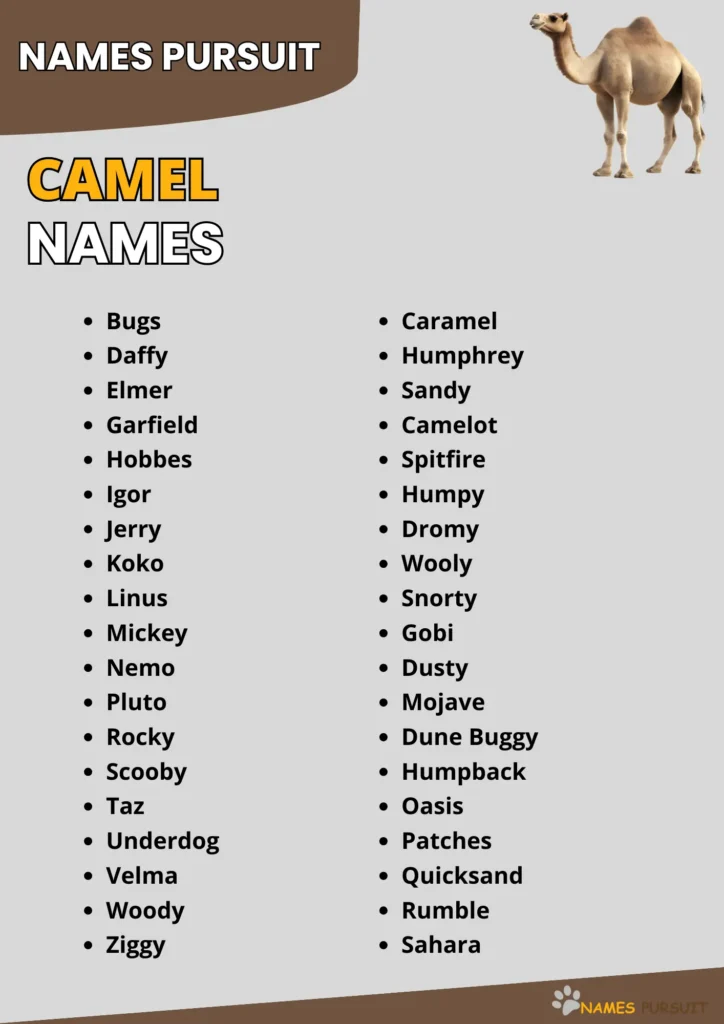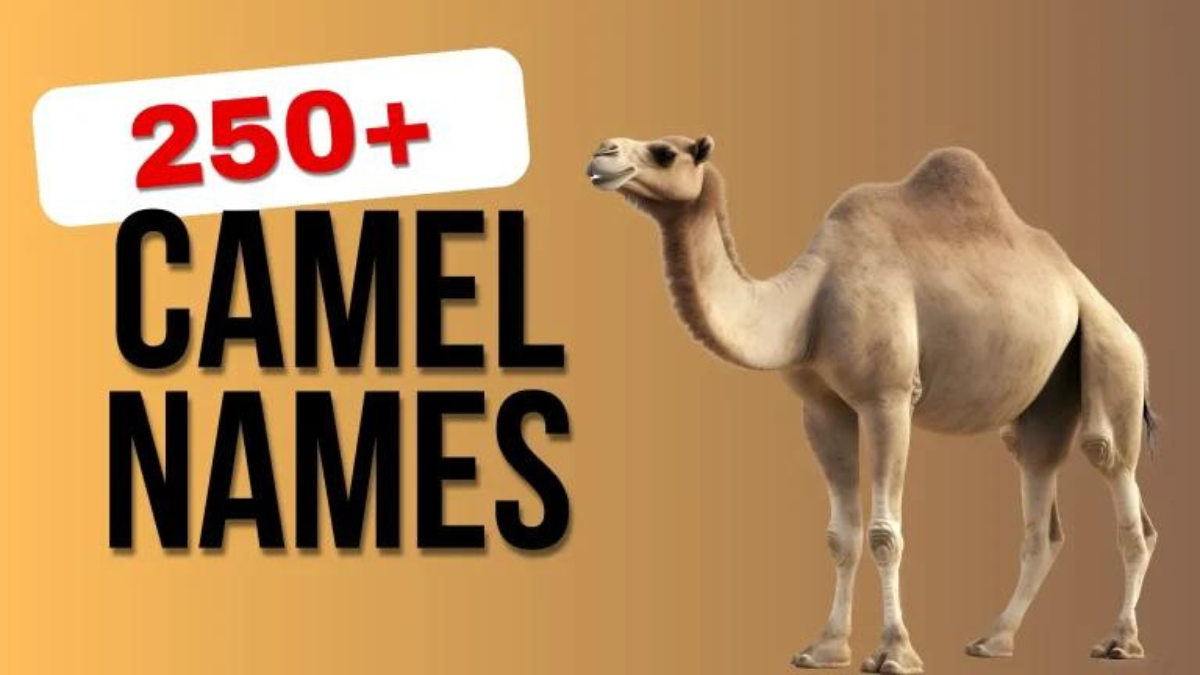When we think about camel names, the first image that often comes to mind is that of a sturdy creature trotting through the vast expanse of desert sand. Known as the “ships of the desert,” camels have been vital to many cultures and economies throughout history. One interesting aspect of camel culture is the names they are given. Camel names not only reflect the character and qualities of the animals but also carry cultural significance and stories of their own. In this article, we will delve into the fascinating world of camel names, exploring their meanings, cultural significance, and some unique names that capture the essence of these remarkable animals.
The Significance of Naming Camels
Cultural Heritage and Identity

Camel names often reflect the cultural heritage of the communities that domesticate and raise them. In many cultures, camels are more than just animals; they symbolize strength, endurance, and survival. The names given to these animals can evoke pride and a connection to tradition. For instance, in Bedouin culture, a camel’s name may be derived from its lineage or a significant event in its owner’s life.
In regions like the Middle East and North Africa, where camels have been integral to daily life, the naming conventions can vary widely, often influenced by local languages and dialects. These names can serve as a point of identity, distinguishing one camel names from another within herds and adding to the rich tapestry of local culture.
Characteristics and Personalities
When camel names, owners often take into account the unique traits and personalities of their animals. Just as people are often named based on their characteristics or family connections, camels are given names that reflect their demeanor, physical attributes, or behaviors. For instance, a particularly swift camel may be named “Lightning,” while a gentle one might carry the name “Peace.”
These names can also evolve. As a camel grows and changes, its name may be adapted to better suit its personality. This reflects the bond between the owner and the camel, illustrating how closely they observe and interact with these animals.
Practical Considerations
From a practical standpoint, having distinct names for each camel names in a herd helps owners manage and track their animals more effectively. In larger herds, names can serve as an efficient way to communicate which camel needs care, feeding, or medical attention. Some owners may choose names that are easy to shout or call, facilitating interactions during herding or training.
Names that reflect specific qualities can also help in training camels for different purposes. For example, a camel trained for racing may have a name that suggests speed, while one intended for carrying heavy loads might have a name that indicates strength.
Unique Camel Names and Their Meanings
Traditional Names
Many camel names are rooted in tradition, reflecting cultural values and history. Names like “Sahra,” meaning “desert,” or “Majid,” which translates to “glorious,” capture the essence of the camel’s environment and purpose. These names often come with stories passed down through generations, enriching their significance.
Another traditional name is “Habibi,” meaning “my beloved” in Arabic. This name showcases the affectionate relationship many owners have with their camels. Camels are not just livestock; they are companions, and names like Habibi embody that bond.
Creative and Playful Names
In contrast to traditional names, some owners opt for more playful or creative names for their camel names. Names like “Bubbles” or “Cinnamon” might be chosen for their quirky appeal. These names often reflect the camel’s appearance or temperament in a lighthearted way, bringing a sense of joy to their ownership.
In a world where personalization is key, some owners have even started to name their camels after popular culture references. Names like “Hannibal” (inspired by Hannibal the Great) or “Frodo” (from The Lord of the Rings) add a modern twist to the age-old tradition of naming.
Names Inspired by Nature
Nature often plays a significant role in the naming of camels. Many names are derived from elements found in the environment, such as “Sandstorm” or “Cactus.” These names not only describe the camel’s habitat but also celebrate the beauty of the natural world surrounding them.
Names like “Sunrise” and “Moonlight” evoke the imagery of the desert landscape and its breathtaking views. Such names reflect the owner’s appreciation for the beauty of the environment and their connection to the land.
Naming Camels in Different Cultures
Middle Eastern Naming Traditions
In Middle Eastern cultures, camels hold a place of reverence. Naming practices often reflect the camel’s lineage, with many owners selecting names that denote the camel’s family history. For example, a camel may be named after its mother or father, continuing the legacy of its lineage.
Furthermore, traditional Bedouin poetry often includes references to camels, and names derived from these poems can carry significant weight. A name like “Al-Badawi,” which translates to “the desert dweller,” not only highlights the camel’s habitat but also embodies a sense of pride and connection to heritage.
African Naming Practices
In various African cultures, camels are also integral to nomadic lifestyles. Naming conventions can differ from one region to another, reflecting local languages and cultural nuances. For example, in parts of East Africa, camels might be named after local wildlife or geographical features, creating a unique identity for each animal.
Names such as “Safari” or “Kilimanjaro” are not uncommon, as they link the camel to the local landscape. These names encapsulate the spirit of exploration and adventure associated with both camels and the regions they inhabit.
Western Influences
As globalization continues to influence naming conventions, some Western-inspired names are making their way into camel nomenclature. Names like “Rocky” or “Princess” are becoming increasingly popular among camel owners in Western contexts. This blending of cultures reflects a growing appreciation for camels beyond their traditional roles, embracing them as pets and companions.
In some cases, owners may even use their favorite movies, books, or historical figures as inspiration for camel names. This trend showcases the versatility of naming practices and the evolving relationship between humans and camels in contemporary society.
The Relationship Between Camel Names and Ownership
Building Bonds Through Naming
The act of naming a camel often signifies a deeper bond between the owner and the animal. A name can evoke affection and a sense of responsibility, highlighting the owner’s commitment to care for their camel. Owners often invest time and energy into nurturing their camels, and names become a part of that relationship.
For many owners, their camel’s name is a source of pride. The right name can elevate the animal’s status within the community, showcasing the owner’s knowledge and connection to the culture surrounding camels. In this way, naming becomes a personal and communal act.
The Role of Camels in Family and Community
In many cultures, camels are not just individual animals but also integral to family and community life. Naming practices can reflect the collective identity of a community, with names passed down through generations. This continuity helps preserve cultural heritage and fosters a sense of belonging.
Additionally, camels often play essential roles in traditional ceremonies and celebrations. Names may carry significance during these events, highlighting the camel’s role in family traditions. For instance, a camel named after a grandparent may be honored during special gatherings, emphasizing the importance of lineage and familial connections.
Stories Behind the Names
Every camel has a story, and often, the name given to a camel reflects a unique narrative. Owners might choose names based on memorable experiences shared with their camels, such as overcoming challenges during a long journey or winning a race together. These stories can become an integral part of the camel’s identity.
Owners frequently recount tales of their camels’ antics, showcasing their personalities and quirks. A camel named “Trouble,” for instance, may have earned its name through mischievous behavior. Such anecdotes not only entertain but also deepen the connection between the owner and their camel, making the name all the more meaningful.
The Future of Camel Naming
Preserving Tradition Amidst Modernization
As societies evolve, so do the naming practices surrounding camels. While traditional names remain significant, there is a growing trend toward more modern and innovative naming conventions. This evolution can be seen as a way to preserve tradition while adapting to contemporary influences.
In some cases, owners are blending traditional and modern names, creating a unique fusion that reflects their personal experiences. This adaptability showcases the dynamic nature of cultural practices, ensuring that camel naming continues to thrive in the face of change.
The Role of Technology in Naming
With advancements in technology, camel owners are increasingly turning to online platforms for inspiration. Social media and blogs dedicated to camel culture often feature unique and creative names, sparking new trends. Owners can now share their camel names with a broader audience, fostering a sense of community among camel enthusiasts worldwide.
Additionally, apps and websites may offer tools for generating names based on specific criteria, such as color, personality, or breed. These technological innovations are making the process of naming more accessible and engaging for camel owners.
The Importance of Cultural Preservation
As globalization continues to influence naming practices, it is essential to recognize the importance of preserving cultural heritage. Camel names serve as a reflection of identity, history, and connection to the land. By honoring traditional naming practices while embracing modern influences, camel owners can contribute to the ongoing dialogue about culture and identity.
Efforts to document and celebrate traditional camel names can help ensure that these practices are passed down to future generations. This preservation is vital not only for maintaining cultural heritage but also for fostering a deeper understanding of the significance of camels in human history.
Conclusion
The world of camel names is a rich tapestry woven from tradition, culture, and personal stories. These names not only serve practical purposes but also reflect the deep bonds between owners and their camels. Whether rooted in heritage or inspired by contemporary influences, camel names carry meaning and significance that resonate across generations.
As we move forward, it is crucial to appreciate and honor the traditions surrounding camel naming while embracing the evolution of this practice. By recognizing the importance of camel names, we celebrate not only the animals themselves but also the cultures and communities that have nurtured these remarkable creatures for centuries. In the end, each name tells a story—a story of connection, pride, and the enduring relationship between humans and camels.
